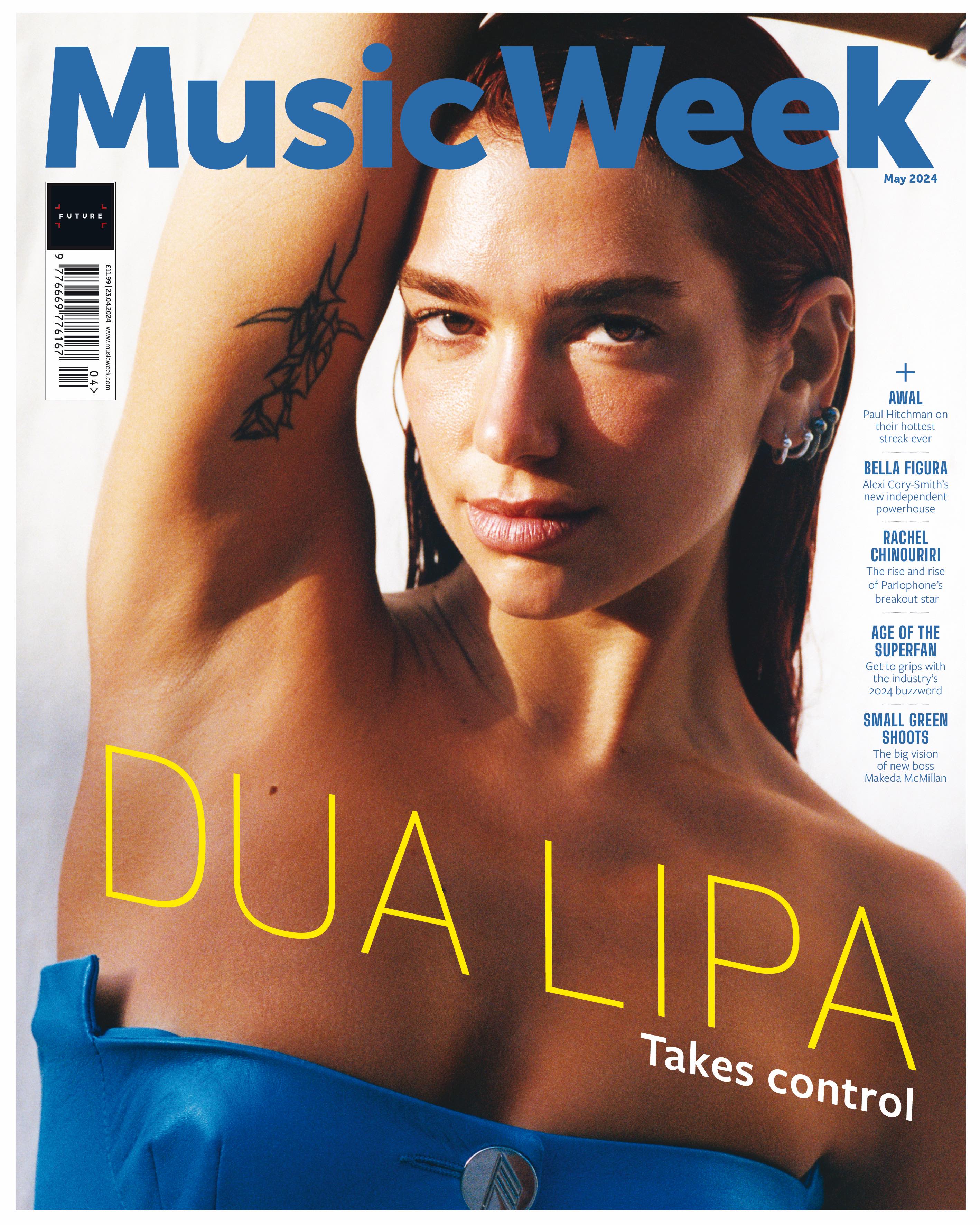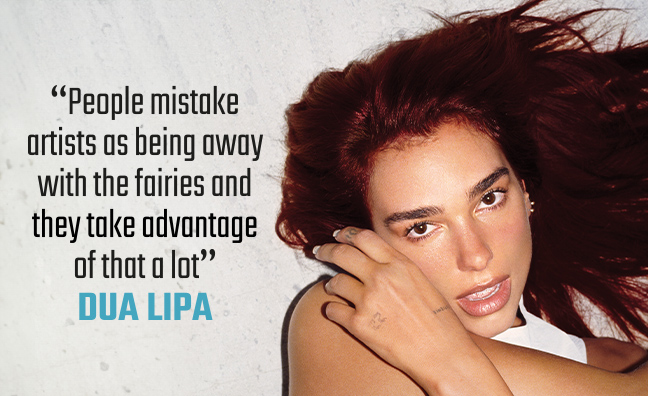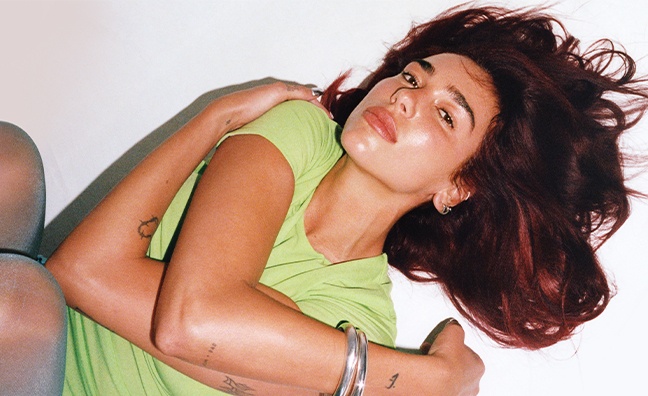Dua Lipa has told Music Week that artists must understand the importance of the business side of the music industry.
Starring on the cover of our May edition, out now, Lipa is set to drop her third album Radical Optimism this week via Warner Records, and it’s her first full-length since she launched her own management, publishing and production company, Radical22.
“It’s about having control over my music, having the final say over what happens to it, how it gets synced…” Lipa told us as we met in East London for our cover interview. “As an artist, it’s important to understand that this is a business. I’ve had to learn so much, so many things that you don’t expect are part of this job.”
The 2024 Glastonbury headliner said that hiring her father Dukagjin, a fellow “workaholic”, as her manager was a “no-brainer”.
“It was very easy to say, ‘This is the person that I trust the most with everything,’ she explained. “He’s my best friend, we have such an open dialogue and that’s why I feel so in control, because there’s not a single email or thing that we wouldn’t talk about. Being in control of your name, your company… It would be cool if [other artists] are looking and wanting to re-evaluate their set-ups.”
Lipa has trailed Radical Optimism with three singles, Houdini, Training Season and Illusion, while she opened the show at both the Grammys and the BRITs.
She worked with a core team of Kevin Parker, Danny L Harle, Caroline Ailin and Tobias Jesso Jr on the album, which she told us marked a change of pace.
“I’ve been listening to the new songs [compared to] Physical or Love Again and they have no relation whatsoever,” she said. “They sound like me because I’m singing them, but sonically they’re worlds apart.”
Further expanding on the recording process, which took place primarily in London, where Lipa could commute into the studio while living at home, she said experimentation was key.
“We weren’t tied down to any one thing,” she said. “We were all on the hunt for something unique, searching for [all things] weird, fun and experimental, while at the same time making a pop record.”
“Writing is definitely not easy, but when you do it with people who allow you to be yourself, you really get the best out of it,” Lipa said. “We all went on so many dinners and to the movies. Or I’d have them over at my house for games nights and I’d open up lots of bottles of natural wine. One night, we threw a rave at a friend’s bar and danced until three or four.”
In the first week of recording, Parker, Harle, Ailin, Jesso Jr and Lipa wrote three songs, Illusion, Watcha Doing and album closer Happy For You.
“That’s very rare,” Lipa said. “It was about being able to dictate. Before, I wasn’t as confident in my craft. I definitely feel so much better about who I am as an artist and a songwriter, what I want to do and say and how I want to say it. Spending that year on tour with Future Nostalgia changed everything. I know what it takes for me to be the best version of myself.”

“Sometimes, it’s necessary to take yourself out of it, which is something I never would have had the courage to do before,” she added, expanding on her newfound courage in the studio. “I would feel like I’d failed. I’d go into a session and if I wasn’t able to produce a song that day, I would be very hard on myself.”
Alongside Lipa in our interview is Warner Records president Joe Kentish, who hooked Lipa up with Kevin Parker via Warner Music UK CEO Tony Harlow, also notes this change.
“Dua had confidence at the start, she had chutzpah, moxie, but it’s less bravado now and more steely confidence,” Kentish told Music Week. “She will examine and change her own work and she doesn’t find that a challenge. She can critique herself and be critiqued in a way that doesn’t harm who she is as a writer. Also, she knows herself much more, which you would hope. She signed at 18 and now she’s 28…”
Lipa also laid bare her frustrations with the industry.
“I’ve spoken to so many different artists about their experiences and I think that people mistake us as being away with the fairies, because we are preoccupied with the creative side and that’s the only thing we really want to be doing,” she said. “People take advantage of that a lot. It’s not just in music, it’s in any field.
“It’s for the big companies to think about paying songwriters more fairly,” she added. “We have to keep applying the pressure. Things aren’t going to just happen, we have to ask for change.”
When it comes to social media, Lipa (who has almost 90 million followers on Instagram, her favoured platform) reserves most of her ire for the negativity that prompted her to hand her Twitter account over to her team in 2020.
“It’s really unhealthy,” she said. “It harbours a certain type of energy that is often at the cost of someone’s feelings. It was a hindrance to my confidence, getting up on stage and thinking that people didn’t like me or that they hated the music. That’s not something that I should be focusing on.”
“I work so hard so why should I not be able to enjoy it?” she added. “That was causing me not to, so getting off Twitter was the best thing I ever did.”
Offering advice on how to stave off the negative side of the industry, she said: “I just do my job and then leave. That is what keeps me sane and allows me to have normal experiences. I love that I get to do music, but it’s not what defines me completely, and I’m happy about that.”
Read the full interview in the new issue of Music Week, out now. Subscribers can read it online here.









